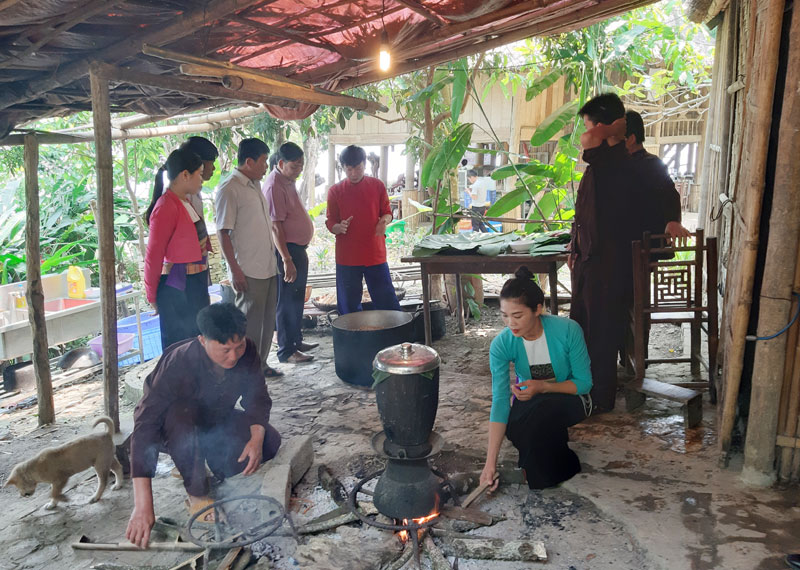


 The People's Committee of Tan Lac district has formulated a
project on preserving the cultural values of Ngoi hamlet for tourism
development. The photo: The people in Ngoi hamlet are being taught to make
traditional wine.
The People's Committee of Tan Lac district has formulated a
project on preserving the cultural values of Ngoi hamlet for tourism
development. The photo: The people in Ngoi hamlet are being taught to make
traditional wine.
Khai Ha Festival in Muong Bi was held dozens of years ago in Phong Phu commune, the center of Muong Bi. Together with Khai Ha Festival in Muong Bi, the other local traditional festivals have also been restored with many good meanings. For example, the Fishing Festival in Lo Son stream and the Festival of Ke pagoda brings a healthy spiritual culture. Tan Lac district pays special attention to preserving and encouraging the collection and preservation of good cultural values of Muong people. Most of the communes are conscious of preserving Muong culture, especially the way of living, eating and accommodating.
In Luy Ai village, Phong Phu commune there are nearly 100% of households still living in the houses on stilts built according to the traditional architecture, remaining the traditional lifestyle of the nation and a lot of ancient working and producing tools are made from wood, bamboo or schizostachyum aciculare such as: looms, bows, crossbows, farming tools and so on. People have a high awareness in preserving the cultural identities and they have been jointly building the new rural areas, improving fields, gardens, renewing houses, making gardens beautiful and alleys civilized.
In the orientation of developing the community tourism to 2020 and orientation to 2030 of the People's Committee of Tan Lac district, they have also clearly identified that the conservation and storage of the traditional cultural values help to build the tourism products meeting the needs of domestic and foreign tourists.
In recent years, the activities of preserving and promoting the traditional cultural values of Muong ethnic people have been carried out to be discussed by the People's Committee of Tan Lac District. In particular, the focus areas identified for the cultural conservation are Ban Ngoi in Ngoi Hoa commune, Buoi Can hamlet in Phu Cuong commune, Chien hamlet in Nam Son commune, Muong Co Luy Ai hamlet in Phong Phu commune, Chien hamlet in Nam Son commune, Buoi hamlet in Phu Cuong commune, Ngoi hamlet in Ngoi Hoa commune and so on. Recently, people have restored a number of traditional jobs such as brocade weaving, wine making, ethnic food and the organization of the traditional folk activities such as raft beating, stick pushing, crossbow shooting, tug of war to develop the community tourism.
Tan Lac district has also established some clubs to preserve Muong ethnic cultural identity in Ngoi hamlet, Ngoi Hoa commune, Dinh II hamlet (Man Duc commune), which has initially been promoting the effectiveness of preserving and promoting the cultural identity of Muong ethnic people. The district also has a plan to organize propaganda to raise the awareness of conserving and preserving the cultural values of Muong ethnic people, as well as organizing the training courses and the traditional vocational training activities for the local people, preserving the cultural activities imbued with the national cultural identities such as the traditional stilt-houses, the national costumes, the lullabies, the gossip singing, gong beating, the show of Muong rituals and so on.